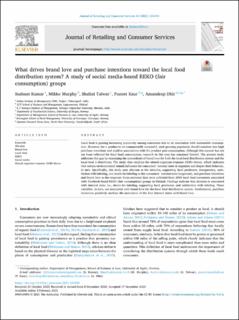What drives brand love and purchase intentions toward the local food distribution system? A study of social media-based REKO (fair consumption) groups
Peer reviewed, Journal article
Published version
Permanent lenke
https://hdl.handle.net/11250/2757178Utgivelsesdato
2021-05Metadata
Vis full innførselSamlinger
Originalversjon
Kumar, S., Murphy, M., Talwar, S. et al. /2021) What drives brand love and purchase intentions toward the local food distribution system? A study of social media-based REKO (fair consumption) groups. Journal of Retailing and Consumer Services, 60, 102444. 10.1016/j.jretconser.2021.102444Sammendrag
Local food is gaining increasing popularity among consumers due to its association with sustainable consumption. However, for a product to be commercially successful, such growing popularity should translate into high purchase intentions and positive associations with the product post-consumption. Although this success has not yet been reflected for local food consumption, research in this area has remained limited. The present study addresses this gap by examining the antecedents of brand love for both the local food distribution system and the local food it distributes. The study thus employs the stimuli-organism-response (SOR) theory, which indicates that certain environmental stimuli influence the consumers' internal state or organism and shapes their behavior, in turn. Specifically, this study uses altruism as the stimulus, supporting local producers, transparency, satisfaction with labeling, and desire for labeling as the consumers’ internal state (organism), and purchase intentions and brand love as the response. Cross-sectional data were collected from 2045 local food consumers associated with Facebook-based REKO (fair consumption) groups in Finland. Findings indicate that altruism is associated with internal state, i.e., desire for labeling, supporting local producers, and satisfaction with labeling. These variables, in turn, are associated with brand love for the local food distribution system. Furthermore, purchase intentions positively mediate the association of the four internal states with brand love.

